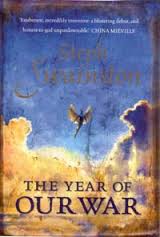 I have a complicated relationship with immersive fiction. As a reader, it’s the ultimate pleasure: to be so thoroughly absorbed in a world, a landscape, a cast of characters that the world you happen to be living in recedes for a while, that there’s nothing you’d rather be doing than reading that book, that returning to it after each forced separation is like hurrying down cellar steps into a lighted, secret domain of intrigue and wonder.
I have a complicated relationship with immersive fiction. As a reader, it’s the ultimate pleasure: to be so thoroughly absorbed in a world, a landscape, a cast of characters that the world you happen to be living in recedes for a while, that there’s nothing you’d rather be doing than reading that book, that returning to it after each forced separation is like hurrying down cellar steps into a lighted, secret domain of intrigue and wonder.
The greater part of what you stand to lose in becoming a writer is the natural, instinctive access to that domain that you enjoy as a reader. You can go there all right, but you run the risk of not giving a shit. Of shrugging your shoulders and sneering ‘yeah, and?’ Of so consistently, so predictably demanding the text teach you something that you forget the joy of story altogether.
I remember when I left home to go to university, being worried about not having access to a piano. I was never what you’d call a real pianist, but my daily contact with the instrument, with my dog-eared collection of beloved sheet music, with the practice of playing, was of such importance to me that I could not imagine a life in which that contact did not form a key component and the very idea of losing it terrified me.
As it happened, there was no problem getting access to pianos at university and I was able to book practice sessions – at the music department in Upper Redlands Road, Reading, then at lovely Knightley, Exeter University’s music department (now closed – another crime against higher learning in Britain) – whenever I wanted. It was only later, when I moved out of higher education and into accommodation where housing a piano would have been difficult to impossible, that the instrument and I began to lose our connection. In sailing so far out into another life, I watched the lights of the old one recede and then disappear. I don’t play now, because I haven’t played in so long I would be appalled to discover the full extent of what I have lost. And so it goes.
For a writer, losing that instinctive and unthinking connection to story is a little bit the same.
I don’t read immersive fantasy because a lot of it is ‘just’ story: there is little for me to learn from it except what happens next. If I’m honest, it has most likely been my too-ready adherence to this prejudice that has formed the core reason it’s taken me so long to get around to reading Steph Swainston’s Castle books. I’ve been aware of the series since the publication of this first instalment back in 2004, even to the extent of knowing broadly who the characters are and what happens to them, but I somehow always managed to put off the actual reading ‘until later’. I finally picked up The Year of Our War just before we moved house, firstly in an attempt to make good that gap, and secondly because after a seven-year hiatus a new Castle book was finally published in December of last year. I felt curious about Fair Rebel as a possible Clarke contender and thought I’d better read at least one of the earlier Castle novels as preparation.
The bare bones of its synopsis might cast The Year of Our War as standard fantasy: the allied kingdoms of the Fourlands are under attack from ferociously invasive giant insects. The people’s only hope are the Eszai, a higher caste of immortals of immense and specific talent, sequestered at the Castle and ruled over by the Emperor, who is himself immortal and not always consistent in his judgements. But to think of Swainston’s novel in such basic terms would be a little like dismissing War and Peace as a family saga.
The Year of Our War was a joy to read. Not just for its story, which I found thoroughly engrossing in a way I’ve not experienced much recently, but for its clear and striking commitment to itself, its willingness to be not ‘quirky’ (a horrid word, which suggests slightness, lack of intellectual depth) but odd. There is coherent worldbuilding here – hardcore fantasy fans need not be disappointed – but the novel constantly subverts itself, shifting its emphasis as the author’s vision demands, pulling the rug from beneath the feet of cosy expectations. There is an acerbic, decidedly offbeat humour, a preoccupation with metaphysics, with contemporary politics, with the off-kilter inner workings of intelligent minds. Swainston’s use of language is deft, imaginative, colourful and so intrinsically fit for purpose you barely stop to notice how breathtakingly lovely it can be and often is.
This is a writer so thoroughly in command of her materials that she knows exactly how and when to break the rules, which is often and inventively and with evident delight.
There is something else, too, a rawness of purpose, an unvarnished quality that is seriously on the endangered list in the increasingly homogenised, sanded-down SFF published by genre imprints. The narrative darts this way and that, veering off at a tangent here, chasing off down a side street there, picking up the thread of the story only fifty pages later. These are the supposedly dodgy habits, the intrusive mannerisms, the blurring of the narrative line that many agents and editors insist are deal-breakers. Gods be thanked then they survive intact here. The Year of Our War is fiction that is meant and felt, fiction that is entirely the product of the author’s vision. Fantasy fction as original as this – as wayward as this – is rarer than you think. While reading The Year of Our War I frequently found myself wondering if any editor working for one of the larger imprints today would have allowed the manuscript to get anywhere near the copy-editing stage without having its wings clipped.
I experienced also a mounting sense of disbelief, that Steph Swainston and the Castle series are not better known. Swainston began publishing just as China Mieville was gaining ascendancy as the premier writer of the so-called ‘New Weird’. There was then and still is now plenty of discussion around whether the New Weird was really a thing, or simply a marketing tactic. Personally I tend towards the belief that it was a thing, and that as a means of talking about the burst of metafictional and conceptual innovation that irrupted into the genre, the novels and writers that defined the field in the early years of the new century, the New Weird was as good a label as any. But could it be that the attention given to Mieville, the overweening emphasis on Mieville sucked the oxygen out of the nascent movement and stopped it actually going anywhere? That less publicised writers like Swainston were sidelined simply by not being China, then found themselves further disadvantaged as Mieville himself became less visible and the excitement around the New Weird began to diminish?
None of this is Mieville’s fault, of course, and difficult to prove either way. What is plainly evident though is that Steph Swainston is one of the most creatively and intellectually ambitious writers working in genre, and – after being faced with this heartbreaking article in 2011 – we should feel thankful and delighted that she is writing again. Not that the industry seems to have learned much in the interim: Fair Rebel was published at the dog-end of the year to little fanfare. And for the record, the whole guff about Swainston’s earlier Castle novels being rejected by awards juries as ‘not science fiction’ is plainly idiotic: if Perdido Street Station could be shortlisted for (and go on to win) the Clarke, why not The Year of Our War? And when are those same juries going to admit that novels featuring wars with giant insects are no less echt SF than novels about generation starships? If it’s a question of which is more likely to happen in a foreseeable future, I know which of the two I’d place my bet on, at any rate…
(You can read a fascinating interview with Steph Swainston about the world of Castle here.)
